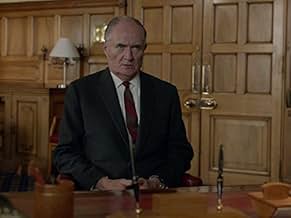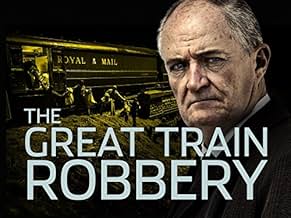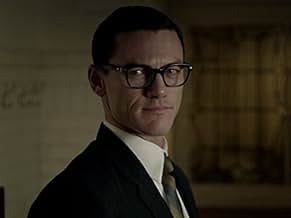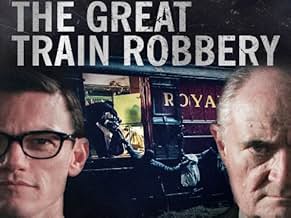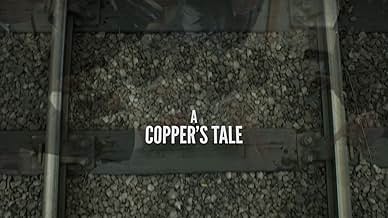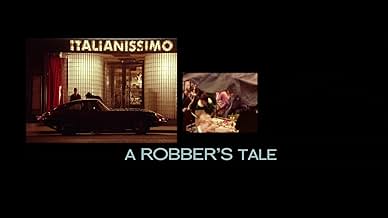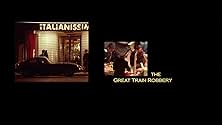AVALIAÇÃO DA IMDb
7,3/10
5,3 mil
SUA AVALIAÇÃO
Um drama dividido em duas partes que retrata O Grande Assalto ao Trem de 8 de agosto de 1963, primeiro do ponto de vista dos ladrões e depois do ponto de vista da polícia que partiu para ide... Ler tudoUm drama dividido em duas partes que retrata O Grande Assalto ao Trem de 8 de agosto de 1963, primeiro do ponto de vista dos ladrões e depois do ponto de vista da polícia que partiu para identificar e capturar os ladrões.Um drama dividido em duas partes que retrata O Grande Assalto ao Trem de 8 de agosto de 1963, primeiro do ponto de vista dos ladrões e depois do ponto de vista da polícia que partiu para identificar e capturar os ladrões.
- Indicado para 1 prêmio BAFTA
- 4 indicações no total
Explorar episódios
Avaliações em destaque
At the time, the Great Train Robbery was the biggest theft in British criminal history and was as much a part of 1963 here as the Profumo Scandal and the emergence of the Beatles. With the fiftieth anniversary of significant events in that year being commemorated right left and centre (the making of the first Beatles album, the first Dr Who TV show, of course the Kennedy assassination), I guess this notorious occurrence was also too big to miss.
With a large cast consisting of some of the best of British male acting talent (female characters hardly get a look-in), painstakingly accurate set design not to mention the actual train itself, the component parts were all there and waiting to be assembled into place. The imaginative decision to break it into two films, the first part concerning the planning and execution of the crime itself and focusing on the criminal gangs which came together to do the misdeed, the second, the aftermath, concentrating on the police investigation run by Jim Broadbent's tough-as-old-boots D.I Tommy Butler, was, on paper, a good one and for the first half certainly successful.
In part one, we see the scheme being formulated by Luke Fisher's bespectacled (obviously marking him out as the brains) Bruce Reynolds the coordinator of the operation, including the recruitment of the necessary personnel, implementation of the crime and the plan on how to escape the law after the robbery. Pacily directed and well-acted by the whole group, the viewer is completely taken into the criminal world and despite myself, caught up in the anticipation and even excitement as they set about their dirty work. I must admit my distaste at the scene where they realise the enormity of what they've done and celebrate with abandon, even though I knew they didn't get away with it for long.
Which leads onto part two, which I felt was altogether less successful. The narrative changes tack and now follows the police investigation into the crime with Broadbent and his weary men one by one picking off the assembled pictures of the perpetrators on their incident-room notice board. Unfortunately at this point the director decides that Broadbent and his team are the UK equivalent of The Untouchables so that we get endless shots of Broadbent grimly gazing at the camera and when they walk, it's in De Palma-esque slow-motion. All the artifice that was stripped away in the impressive first 90 minutes is overloaded into the second one and while there's still drama in watching all the villains get their come-uppance, you completely lose the sense of authenticity built up thus far. The soundtrack was confusing too, quite why 50's Frank Sinatra songs proliferate, I can't tell and for some reason the great Spencer Davis Group song "I'm A Man", cut in 1966 gets played as the background to events from three years before. The use of Nina Simone songs, especially "Sinner Man" did work better but again, like the overall production, they only got this part half-right too.
I almost thought that the two parts must have been directed by two different directors but no, it was just poor execution of a good plan, sort of like how the robbers handled their getaway.
With a large cast consisting of some of the best of British male acting talent (female characters hardly get a look-in), painstakingly accurate set design not to mention the actual train itself, the component parts were all there and waiting to be assembled into place. The imaginative decision to break it into two films, the first part concerning the planning and execution of the crime itself and focusing on the criminal gangs which came together to do the misdeed, the second, the aftermath, concentrating on the police investigation run by Jim Broadbent's tough-as-old-boots D.I Tommy Butler, was, on paper, a good one and for the first half certainly successful.
In part one, we see the scheme being formulated by Luke Fisher's bespectacled (obviously marking him out as the brains) Bruce Reynolds the coordinator of the operation, including the recruitment of the necessary personnel, implementation of the crime and the plan on how to escape the law after the robbery. Pacily directed and well-acted by the whole group, the viewer is completely taken into the criminal world and despite myself, caught up in the anticipation and even excitement as they set about their dirty work. I must admit my distaste at the scene where they realise the enormity of what they've done and celebrate with abandon, even though I knew they didn't get away with it for long.
Which leads onto part two, which I felt was altogether less successful. The narrative changes tack and now follows the police investigation into the crime with Broadbent and his weary men one by one picking off the assembled pictures of the perpetrators on their incident-room notice board. Unfortunately at this point the director decides that Broadbent and his team are the UK equivalent of The Untouchables so that we get endless shots of Broadbent grimly gazing at the camera and when they walk, it's in De Palma-esque slow-motion. All the artifice that was stripped away in the impressive first 90 minutes is overloaded into the second one and while there's still drama in watching all the villains get their come-uppance, you completely lose the sense of authenticity built up thus far. The soundtrack was confusing too, quite why 50's Frank Sinatra songs proliferate, I can't tell and for some reason the great Spencer Davis Group song "I'm A Man", cut in 1966 gets played as the background to events from three years before. The use of Nina Simone songs, especially "Sinner Man" did work better but again, like the overall production, they only got this part half-right too.
I almost thought that the two parts must have been directed by two different directors but no, it was just poor execution of a good plan, sort of like how the robbers handled their getaway.
Broadcast in two parts - "The Robber's Tale" and "The Copper's Tale" - THE GREAT TRAIN ROBBERY retells the famous events of August 1963 when over £2m. was stolen from a mail train traveling from Glasgow to London. The events have been extensively retold elsewhere, notably in Peter Yates' fictionalized version ROBBERY (1967) with Stanley Baker, or BUSTER (1988) a comedy-drama with Phil Collins as robber Buster Edwards. "The Robber's Tale" (dir. Julian Jarrold) focuses specifically on Bruce Reynolds (Luke Evans) as the brains behind the whole operation; the more celebrated crook Ronald Biggs (Jack Gordon) - who passed away the night the program received its first broadcast - receives scant attention. "The Copper's Tale" looks at the painstaking ways in which Tommy Butler (Jim Broadbent) went about investigating the case and bringing the criminals to justice. Stylistically speaking the production is very much in keeping with current British television costume dramas, with low-key, almost washed-out lighting, lots of period detail (for example, the obligatory London bus from the mid-Sixties) passing across the back of the frame, or a couple of young mothers pushing their prams round the park) and plenty of focus on character through shot/reverse shot sequences. The style is diffuse, with the emphasis placed on ambiance as much as plot. "The Robber's Tale" actually proves something of a disappointment; not a lot happens in terms of action, while some of the (predominantly youthful) cast simply do not seem convincing as mid- Sixties London hoodlums. Perhaps they might have done more research into the behavior, mannerisms and (most significantly) the argot of that period. "The Copper's Tale" is a lot better, not least because of the interplay - or should that be rivalry - between Butler and his immediate subordinate Frank Williams (Robert Glenister). Although ostensibly on the same side, they seem unable to form a united front, at least professionally. Butler might be a good cop, but he certainly lacks any management abilities.
I enjoyed this first episode although of course we all know the story. And an important part of the story is that it all happened in August of 1963. Now I was only 4 years old that year so cant quite remember what the summer of '63 was like but I would bet a large amount of money (maybe even 2.1 million pounds)on a couple of things...first there were probably leaves on the trees and secondly it is doubtful that there was snow on the ground and indeed falling in London...in the middle of August!!! What were the producers thinking? During the episode there are several captions giving the date...including the 8th August 1963. Why or why did they create a setting that looked like January or February! There wasn't even any attempt to produce a blue sky! A good film, well acted and written but ruined by the weather! Only in England!!!
I managed to watch this on Amazon prime.
It's nothing to get overly excited about. The over the top cockney accents can get a bit annoying at times. And the acting from some is a bit wooden. But all that being said I did still really enjoy this. You just have to go in to it with the right attitude. Still well worth a watch if you are looking for something easy to follow to kill a few hours. Enjoy.
It's nothing to get overly excited about. The over the top cockney accents can get a bit annoying at times. And the acting from some is a bit wooden. But all that being said I did still really enjoy this. You just have to go in to it with the right attitude. Still well worth a watch if you are looking for something easy to follow to kill a few hours. Enjoy.
This almost documentary style film made for interesting viewing, and this may have been Luke Evans' first leading role, and he grabbed the opportunity with lots of panache. As the leader of the band of robbers who pulled off the heist, I had some difficulty in focusing on who he was as Buster Edwards and Ron Biggs were always better known. The film however did show that this was a big gang of thieves, and this probably led to their undoing. The actual heist took up little screen time, the rest dealt with the dynamic between the gang, and the motivation of the ringleaders apart from the usual greed, is clearly shown. I enjoyed it, there was always the feeling that this was a gang who were in over their heads, and there is one telling moment when they realize it after counting the money.
The early sixties setting with its talk of the war years and exploits of that time is well realized, making this a series to be enjoyed. Martin Compston had a small but significant role as well.
The second instalment is just as fascinating when you are given the opportunity to see the trail of clues the gang left behind them in the old farmhouse, even after 'apparently' cleaning up! A restrained but driven Jim Broadbent gives the sense of urgency the Police felt about solving this crime, and it says much about the actors concerned, that you almost wanted the robbers to get away with it! Perhaps that explains the success of later series like Money Heist which focus on that.
The early sixties setting with its talk of the war years and exploits of that time is well realized, making this a series to be enjoyed. Martin Compston had a small but significant role as well.
The second instalment is just as fascinating when you are given the opportunity to see the trail of clues the gang left behind them in the old farmhouse, even after 'apparently' cleaning up! A restrained but driven Jim Broadbent gives the sense of urgency the Police felt about solving this crime, and it says much about the actors concerned, that you almost wanted the robbers to get away with it! Perhaps that explains the success of later series like Money Heist which focus on that.
Você sabia?
- CuriosidadesRonald Biggs, one of the last surviving Great Train Robbers, died on 18 December 2013, the same day that this two-part series was first shown.
- Erros de gravaçãoPolice Officers are shown wearing white shirts. In 1963 Constables and Sergeants in all English police forces wore blue shirts. The change to white shirts came in the late 1970s.
- ConexõesReferences O Primeiro Assalto de Trem (1978)
Principais escolhas
Faça login para avaliar e ver a lista de recomendações personalizadas
- How many seasons does The Great Train Robbery have?Fornecido pela Alexa
Detalhes
- Data de lançamento
- País de origem
- Central de atendimento oficial
- Idioma
- Também conhecido como
- 火車大劫案
- Locações de filme
- Empresas de produção
- Consulte mais créditos da empresa na IMDbPro
- Tempo de duração1 hora 30 minutos
- Cor
Contribua para esta página
Sugerir uma alteração ou adicionar conteúdo ausente

Principal brecha
What is the French language plot outline for The Great Train Robbery (2013)?
Responda


